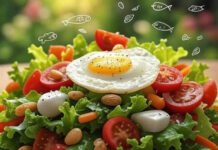Getting older is a natural part of life, bringing wisdom, experience, and perhaps a little more time for ourselves. As we age, our bodies change, and so do our nutritional needs. Focusing on Essential Nutrition for Seniors isn’t just about eating; it’s about fueling your body and mind to maintain vitality, manage health conditions, and truly enjoy your golden years. If you’re wondering how to stay healthy as you age, paying attention to what’s on your plate is one of the most powerful steps you can take. This guide will walk you through the core principles of senior nutrition to help you live your healthiest, most vibrant life.

Why Essential Nutrition for Seniors is Crucial for Healthy Aging
Good nutrition plays a pivotal role in maintaining health and independence as you age. It helps support your immune system, strengthens bones and muscles, keeps your mind sharp, and provides the energy you need for daily activities. Ignoring Essential Nutrition for Seniors can increase the risk of deficiencies, lead to slower recovery from illness, impact energy levels, and worsen chronic conditions. Prioritizing healthy eating is an investment in your well-being and quality of life.
Key Nutrients in Essential Nutrition for Seniors
Understanding which nutrients are particularly important for older adults is key to effective Essential Nutrition for Seniors. While variety is always best, certain vitamins, minerals, and macronutrients deserve special attention.
Protein for Muscle Strength and Essential Nutrition for Seniors
Muscle mass naturally declines with age, a process called sarcopenia. Adequate protein intake is vital for maintaining muscle strength, which helps with mobility, balance, and preventing falls. Aim to include a source of lean protein at every meal.
- Good Sources: Lean meats, poultry, fish, eggs, beans, lentils, tofu, Greek yogurt, nuts, and seeds.
- Actionable Tip: Try adding a handful of beans to your soup, an egg to your breakfast, or a side of grilled fish for dinner.
Fiber for Digestive Health in Essential Nutrition for Seniors
Fiber is crucial for a healthy digestive system, preventing constipation, which is common among older adults. It also helps manage blood sugar levels and can contribute to heart health.
- Good Sources: Whole grains (oats, brown rice, whole wheat bread), fruits, vegetables, beans, lentils, nuts, and seeds.
- Actionable Tip: Swap white bread for whole wheat, add berries to your morning oatmeal, or snack on raw vegetables with hummus.
Vitamins and Minerals for Essential Nutrition for Seniors
As we age, our bodies may become less efficient at absorbing certain nutrients, and some medications can affect nutrient levels. Focusing on nutrient-dense foods is a cornerstone of Essential Nutrition for Seniors.
- Calcium and Vitamin D: Essential for bone health and preventing osteoporosis. Calcium is found in dairy products, leafy greens, and fortified foods. Vitamin D comes from sunlight exposure, fortified foods, and supplements.
- Vitamin B12: Important for nerve function and red blood cell formation. Absorption can decrease with age. Found in animal products and fortified foods.
- Potassium: Helps maintain healthy blood pressure. Found in bananas, sweet potatoes, spinach, and beans.
- Omega-3 Fatty Acids: Good for heart and brain health. Found in fatty fish (salmon, mackerel), flaxseeds, chia seeds, and walnuts.
[Image Placeholder: Image 1 – A vibrant, colorful plate filled with a variety of healthy foods recommended for seniors: a piece of baked fish or lean protein, brightly colored cooked vegetables, a portion of brown rice or quinoa, and some berries. The style should be clean, well-lit, and appealing, emphasizing freshness and variety. Use natural light if possible. Color scheme: Diverse, bright food colors.]
Hydration: A Vital Part of Essential Nutrition for Seniors
Often overlooked, staying adequately hydrated is fundamental for overall health, including digestion, circulation, and cognitive function. Seniors may have a reduced sense of thirst, making it important to be mindful of fluid intake throughout the day.
- Tips for Staying Hydrated: Drink water regularly, even if you don’t feel thirsty. Include fluids from other sources like tea, milk, soup, and water-rich fruits and vegetables (watermelon, cucumbers).
- Actionable Tip: Keep a water bottle handy as a visual reminder. Set reminders to drink if necessary.

Planning Healthy Meals for Essential Nutrition for Seniors
Making healthy eating a habit involves some planning. Simple strategies can make Essential Nutrition for Seniors easier and more enjoyable.
- Focus on Nutrient Density: Choose foods that pack the most nutrients into fewer calories.
- Portion Control: Be mindful of serving sizes to maintain a healthy weight.
- Regular Meals: Try to eat at consistent times each day to maintain energy levels and regulate appetite.
- Shopping Smart: Plan your meals and snacks before grocery shopping to make healthier choices and reduce waste.
Overcoming Challenges in Essential Nutrition for Seniors
Several factors can make Essential Nutrition for Seniors challenging:
- Changes in Appetite or Sense of Taste/Smell: Flavor enhancers (herbs, spices, lemon juice) can help make food more appealing.
- Chewing or Swallowing Difficulties: Modify food textures (soft, chopped, pureed) while ensuring nutrient content remains high.
- Limited Budget: Focus on affordable nutrient-dense options like beans, lentils, eggs, seasonal vegetables, and frozen produce.
- Social Isolation: Eating with others can make meals more enjoyable and encourage better intake. Look for senior meal programs or community dining opportunities.
[Outbound Link Placeholder: Link to a resource offering recipes or meal ideas tailored for seniors with modified textures or specific dietary needs]
Making Essential Nutrition for Seniors a Delicious Reality
Healthy eating doesn’t have to be bland! Experimenting with new recipes, trying different fruits and vegetables, and enjoying meals with friends and family can make Essential Nutrition for Seniors a truly positive experience. Think of food as nourishment and pleasure.
- Actionable Tip: Join a cooking class, try one new healthy recipe each week, or plan a regular mealtime with a friend or family member.
Actionable Takeaways for Essential Nutrition for Seniors
Here are key steps you can take starting today to improve your nutrition:
- Assess Your Diet: Keep a food diary for a few days to see what you’re currently eating.
- Focus on Color: Aim for a variety of colorful fruits and vegetables each day.
- Boost Protein: Include a source of lean protein at every meal.
- Increase Fiber: Choose whole grains, add beans, and eat more fruits and veggies.
- Stay Hydrated: Drink water throughout the day, even between meals.
- Talk to a Professional: Consult your doctor or a registered dietitian for personalized advice tailored to your health needs and medications.
- Make it Social: Share meals with others when possible.

Prioritizing Essential Nutrition for Seniors is a gift you give yourself. By making conscious choices about the foods you eat, you empower yourself to live a healthier, more active, and more fulfilling life as you age. It’s never too late to start making positive changes.
































